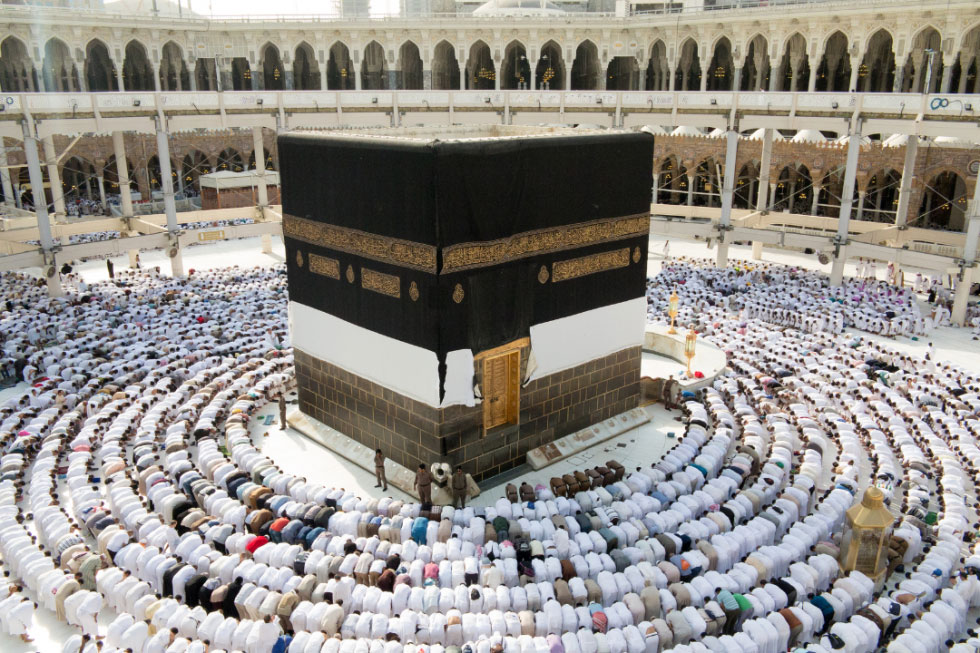This year’s Hajj takes place in Saudi Arabia from June 14th to 19th, 2024. Hajj is the annual Islamic sacred pilgrimage to Mecca. Millions of Muslims from around the world gather each year in Mecca, the holy city for Muslims. It is one of the largest mass gatherings in the world. The dates for Hajj change each year based on the 8th to 13th day of the last month of the Islamic calendar. Whereas Hajj takes place on specific dates each year, Umrah is a pilgrimage to Mecca that can be completed at any time of the year.
The Ministry of Health of the Kingdom of Saudi Arabia issues specific health and vaccination requirements for those planning to participate in Hajj or Umrah. This includes vaccination against meningitis ACYW-135 for ALL travelers older than 1 year of age. The Registered Nurses at TMVC can provide you with the proof of meningitis ACYW-135 vaccination required for your visa to enter Saudi Arabia and complete the holy Hajj pilgrimage. In this blog we’ll tell you more about the required meningitis vaccine and other health risks to consider for your trip to Mecca.
What is Required for the Meningitis ACYW-135 Vaccine?
Proof of vaccination for the quadrivalent meningitis ACYW-135 vaccine is required at least 10 days prior to arrival in Saudi Arabia. Depending on the vaccine type it is valid for either 3 years if a polysaccharide vaccine is given, or 5 years if a conjugate vaccine is given. If the vaccine type is not written on your record, it will only be valid for 3 years. TMVC will provide proof of vaccination with a conjugate meningitis ACYW-135 vaccine, valid for 5 years.
Why is the Meningitis ACYW-135 Vaccine Required?
 The quadrivalent meningitis vaccine provides protection against 4 strains of meningococcal meningitis (A, C, Y, W-135). Meningitis is a serious and potentially life-threatening bacterial infection of the brain and spinal cord. Meningitis bacteria are spread through close contact from person to person by sneezing, coughing, or kissing. It can also be spread by sharing utensils or cups, cigarettes, lipstick, or other objects that touch the mouth.
The quadrivalent meningitis vaccine provides protection against 4 strains of meningococcal meningitis (A, C, Y, W-135). Meningitis is a serious and potentially life-threatening bacterial infection of the brain and spinal cord. Meningitis bacteria are spread through close contact from person to person by sneezing, coughing, or kissing. It can also be spread by sharing utensils or cups, cigarettes, lipstick, or other objects that touch the mouth.
The crowded conditions at Hajj are the perfect environment for the spread of the meningitis bacteria, and outbreaks have occurred in the past. During the Hajj pilgrimages in 2000 and 2001 outbreaks of meningitis occurred and led to the spread of the disease globally. It’s been estimated that the overcrowding at Hajj with millions of pilgrims increases the risk of disease transmission by 78 times. Vaccination with the quadrivalent meningitis ACYW-135 vaccine has been effective at reducing the risk of a meningitis outbreak at Hajj.
Are There Any Other Health Requirements?
If you’re travelling directly from North America then the only required vaccine is for meningitis ACYW-135. Other travelers may be required to show proof of polio or yellow fever vaccination, depending on which country they are travelling from. If you’re planning to travel to any countries outside North America before completing Hajj or Umrah, book a travel consultation to find out if the yellow fever or polio vaccines are required for your itinerary.
Other Health Risks at Hajj
 While the only required vaccine for travelers from North America is the meningitis ACYW-135 vaccine, there are other health risks at Hajj and other vaccines to consider.
While the only required vaccine for travelers from North America is the meningitis ACYW-135 vaccine, there are other health risks at Hajj and other vaccines to consider.
Respiratory Diseases
Pilgrims participating in the crowded conditions at Hajj are at increased risk for respiratory diseases. These diseases can be easily spread by coughing, sneezing, or even just talking in close contact with others. Respiratory infections occur frequently during Hajj, with pneumonia being one of the most common causes of hospital admission. Recommended vaccines to protect against respiratory illnesses include:
- Tetanus/diphtheria/pertussis
- Influenza
- Pneumonia for all adults 65 years of age and older, and for younger pilgrims with certain high risk medical conditions
- RSV for adults 60 years of age and older, especially those with chronic health conditions or a weakened immune system
- COVID-19
Food and Waterborne Diseases
Traveler’s diarrhea is common in pilgrims, and other food and waterborne diseases are a risk. Pilgrims should consider carrying medication for self-treatment of traveler’s diarrhea, which can be arranged during a travel consultation at TMVC. Recommended vaccines to protect against food and waterborne illnesses include:
- Hepatitis A
- Polio
- Dukoral to prevent traveler’s diarrhea
- Typhoid
Bloodborne Diseases
Once Hajj is complete, Muslim men shave their heads. Licensed barbers are tested for bloodborne illnesses including hepatitis B, hepatitis C, and HIV, and use only single-use, disposable blades. Avoid unlicensed barbers where bloodborne diseases could be spread and consider getting vaccinated against hepatitis B.
Heat Related Illnesses
 Daytime temperatures can reach 50°C during Hajj. The pilgrimage may include long distances walked, and demanding physical challenges. Just under half of pilgrims walk the 23.9km Hajj rituals over 5 days. Heat related illnesses are common, including heat exhaustion and heat stroke, which can potentially be fatal. It’s important for pilgrims to stay well hydrated, wear sunscreen, and seek shade whenever possible.
Daytime temperatures can reach 50°C during Hajj. The pilgrimage may include long distances walked, and demanding physical challenges. Just under half of pilgrims walk the 23.9km Hajj rituals over 5 days. Heat related illnesses are common, including heat exhaustion and heat stroke, which can potentially be fatal. It’s important for pilgrims to stay well hydrated, wear sunscreen, and seek shade whenever possible.
Measles
Measles is one of the most contagious diseases known. Ongoing outbreaks around the world means that an infected pilgrim could potentially spread the disease to the crowds at Hajj. Pilgrims born after 1957 should ensure they are up to date on their measles/mumps/rubella (MMR) vaccine.
How to Book Your Meningitis Vaccine Appointment
TMVC can help to prepare you for a healthy and happy Hajj. We will provide you with the required meningitis ACYW-135 vaccine and the proof of vaccination required for your visa. Simply call us at 1-888-288-8682 or book online.
Visit the Ministry of Health of the Kingdom of Saudi Arabia for a complete list of health recommendations and requirements for your pilgrimage to Hajj.

